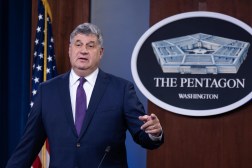Pentagon tech chief nominee wants more upfront funding for programs

The Biden administration’s nominee for the role of top technology official at the Department of Defense wants to see an overhaul of budgeting processes that could allow for more innovation and lower sustainment costs.
At a confirmation hearing Tuesday before the Senate Armed Services Committee, Heidi Shyu told Senators that extra early-stage funding for the DOD’s weapons platforms, tech projects and other systems would keep programs running and help to curtail their costs in the long term.
“Today, sustainment makes up 70% of total weapon system cost, with development and procurement making up 30%.
“DOD should strive to flip this ratio and invest more in the development of new technologies than it does in the sustainment of legacy systems,” Shyu told lawmakers.
Such a change would represent a shift in funding practices, and a move towards more agile systems development.
The technology leader was speaking alongside nominees to the posts of Air Force Secretary, Under Secretary of Defense for Research and Engineering at the DOD, and Director of Cost Assessment and Program Evaluation at the DOD.
Air Force Secretary nominee Frank Kendall agreed with Shyu, and added that for the USAF such an approach to program funding would permit greater experimentation and allow for more failures.
“Having the discipline to do the things that are necessary up front that would lower sustainment costs is critical,” he said.
Additional early-stage funding permits more agile development of modular systems, which ultimately can make it easier and cheaper to fix errors that arise at a later stage. Currently, programs run through a two-year budgetary cycle where requests need to be proposed by the DOD to Congress before they can get off the ground. At the current pace of development, military technology is often outdated by the time it is fully implemented.
The two-year budgeting cycle has hit software acquisition especially hard, as code needs frequent updates to patch security flaws and bugs.
Shyu’s job, if confirmed, would be to oversee all research and engineering projects, from basic research to advanced artificial intelligence work. Shyu has a background in both tech and contracting. Previously she served as the head of acquisition, technology and logistics for the Army during the Obama administration.
Addressing lawmakers on Tuesday, Shyu also advocated for the use of rapid prototyping contracts, like Other Transaction Agreements (OTAs), which she said could be used more throughout the department to navigate around the budget cycle. According to the senior tech leader, the DOD would also benefit significantly from flexible research techniques used by the private sector, such as “plug and play”.
“There is absolutely a gap in terms of our ability to purchase tech.
“Software is ubiquitous in all of our weapons systems and we have to think about how we can develop software continuously and test it continuously,” she added.
If confirmed as Air Force Secretary, Kendall will oversee the vast, highly technical suite of programs in the Air and Space Force, from new network-of-network systems like Advanced Battle Management System to jet fighters and satellites.






